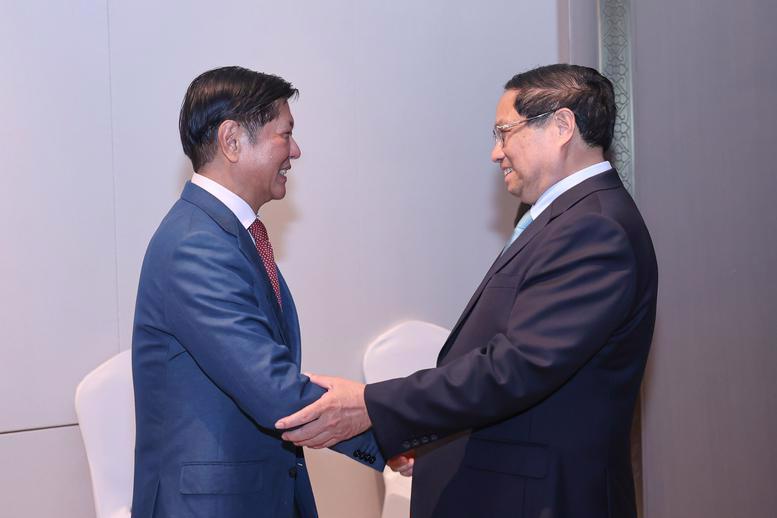Prime Minister Pham Minh Chinh met with Philippine President Ferdinand Romualdez Marcos Jr. in Vientiane, Laos, on October 8, during their stay there to attend the 44th and 45th ASEAN Summits and related meetings.
Discussing key areas of cooperation for the future, PM Chinh suggested that both sides continue to effectively promote existing cooperation mechanisms, particularly the Joint Committee for Bilateral Cooperation.
He emphasized the need to enhance agricultural and economic-trade cooperation to match the potential of both countries, further open markets for each other’s goods, and increase bilateral trade turnover to $10 billion by 2025.
PM Chinh also proposed that both sides actively consider expanding cooperation into new areas, supporting strategic breakthroughs such as artificial intelligence, cloud computing, the Internet of Things, digital economy, green economy, energy transition, and development of electric vehicle ecosystems.
President Marcos agreed that both sides should closely coordinate to implement the outcomes of his State visit to Vietnam in January and prepare for activities to celebrate the 10th anniversary of the Strategic Partnership between the two countries in 2025.
He urged Vietnam to continue supporting the Philippines in ensuring food security and to effectively implement the Memoranda of Understanding on agricultural cooperation and rice trade signed earlier this year.
He expressed high appreciation for Vingroup’s electric vehicle development projects in the Philippines, as well as for the cooperation projects between enterprises of the two countries in high-tech fields.
Regarding maritime cooperation, both sides agreed to continue consulting and closely coordinating on maritime issues, strengthening maritime cooperation, and promoting the development of an effective and practical Code of Conduct (COC) in accordance with international law, including the 1982 United Nations Convention on the Law of the Sea (UNCLOS).
During the meeting, both leaders agreed to further deepen the bilateral relationship in a practical, sustainable, and long-term manner, thus contributing positively to a strong ASEAN Community, and promoting peace, stability, and sustainable development in the region and the world.









 Google translate
Google translate